Lusha vs Apollo: Which Tool Is Best?
- 01Lusha vs Apollo.io: overview
- 02What's the difference between Lusha and Apollo.io?
- 03Lusha pros and cons
- 04Apollo.io pros and cons
- 05Lusha compared to Apollo.io
- 06Apollo.io compared to Lusha
- 07Features comparison
- 08Lusha vs Apollo.io: Which is the best for your business?
- 09Promotions on Lead Management software
- 10Alternatives to Lusha & Apollo.io
Save up to $4,800 on Apollo.io
Save up to $4,800 on Apollo.io
Sales intelligence platforms play a pivotal role in efficient lead generation and prospecting by providing accurate B2B contacts. With this valuable information, businesses can prioritize leads strategically and engage with them more precisely. However, with many sales intelligence tools out there, choosing the right one can feel daunting.
To help you out, this article compares two of the leading sales intelligence platforms—Lusha vs Apollo. With an in-depth analysis of their features, advantages, disadvantages, and primary use cases, you’ll have the information you need to help decide which tool best supports your sales processes. Let’s delve in.
Lusha vs Apollo.io: overview
Lusha and Apollo are prominent players in the realm of sales intelligence and lead generation platforms, each offering unique features and advantages tailored to diverse business needs.
Lusha is renowned for its simplicity and efficiency in providing contact and company information. It specializes in offering accurate direct phone numbers and email addresses, which is particularly beneficial for sales professionals and recruiters who need quick access to potential leads' contact information. Conversely, Apollo stands out with its comprehensive sales intelligence suite. It offers not just contact information but also a rich set of features including lead scoring, email sequencing, and advanced analytics.
Now, let's explore the Lusha vs. Apollo comparison further to help you make a well-informed decision when it comes to selecting the right sales intelligence platform for your specific requirements.
What's the difference between Lusha and Apollo.io?
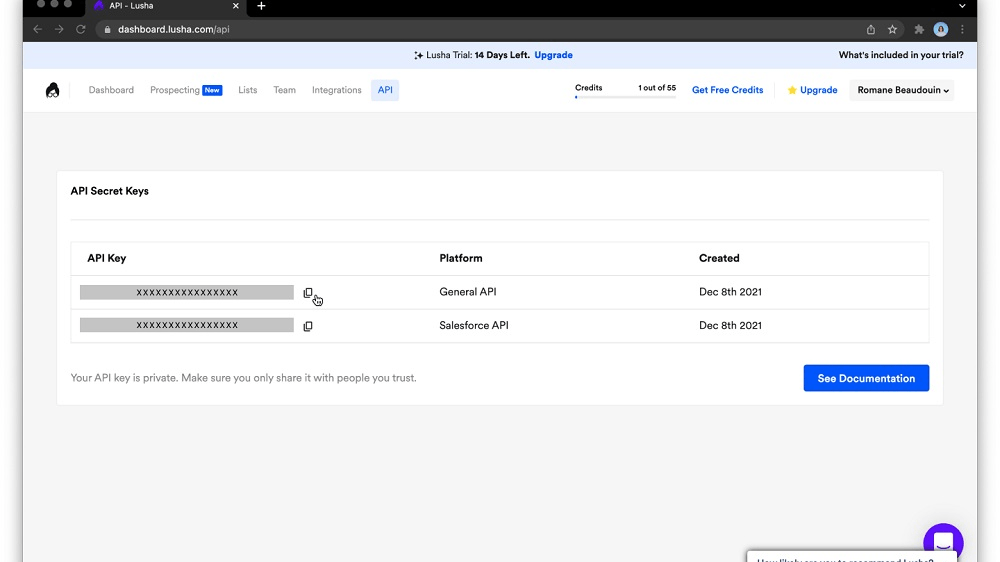
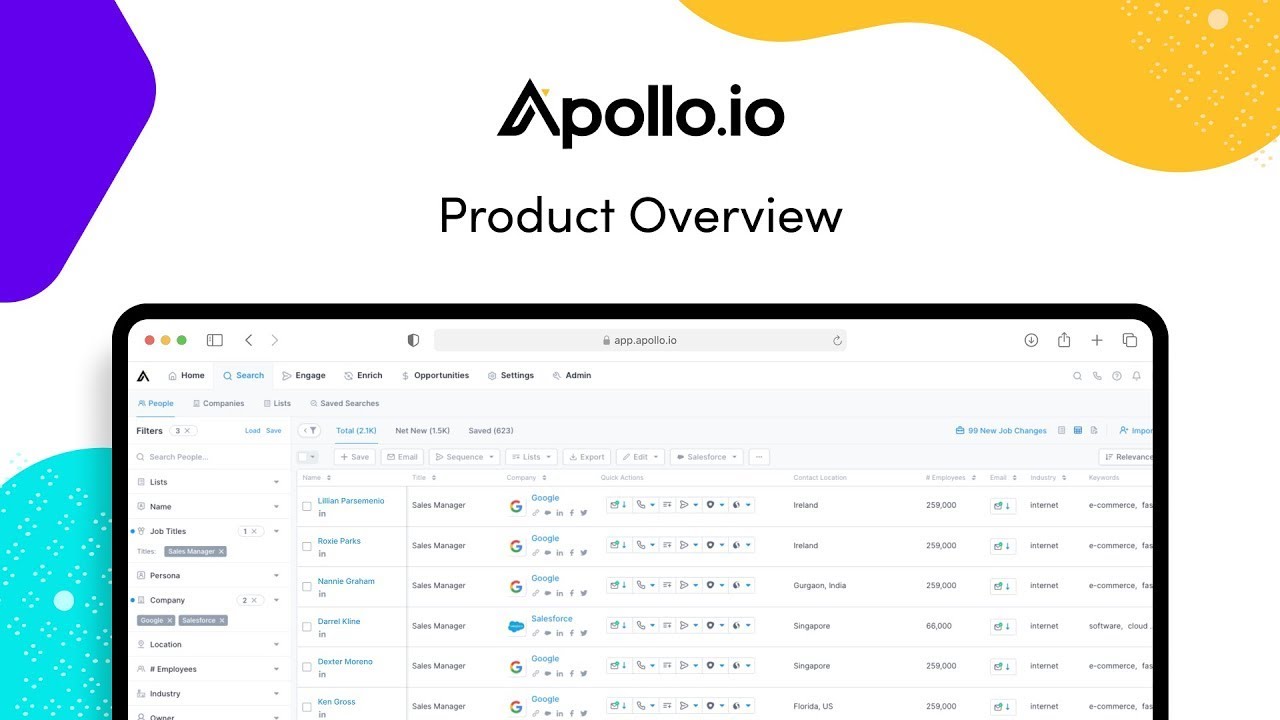
As lead generation software, Lusha and Apollo provide access to extensive B2B contacts worldwide to improve and streamline your prospecting. However, it’s important to note some key distinctions between the two platforms when deciding which is best for your business. One of the main differences is the scope of their features. Lusha is a dedicated B2B sales intelligence platform, granting users access to contacts that help sales teams with lead generation and prospecting. Lusha’s Chrome extension lets users quickly retrieve contact data on LinkedIn, Salesforce, or company sites. On the other hand, Apollo’s sales intelligence platform is complemented by a range of other features, turning it into an end-to-end sales platform. Apollo offers features to support each stage of the sale process, including contact data and enrichment, engagement tools like email automation and AB testing, goal tracking, and deal data.
Another significant difference is the platforms’ approach to Do Not Call (DNC) lists, an important aspect in compliant lead prospecting to avoid hefty financial penalties. Both Lusha and Apollo only provide DNC list clearing for contacts in the US and UK. Importantly, Apollo’s list clearing applies solely to new direct dial requests, not existing numbers or those from your CRM database. Lusha’s DNC list-clearing feature is only available with its highest-tier plan, meaning users on other plans need to manually check their lists or use a third-party DNC scrubbing app.
Finally, the inclusions within Lusha and Apollo’s free plans offer also differ. Lusha’s free plan, limited to five monthly credits and one user, provides access to email addresses, direct dial numbers, landline numbers, and company data. Compared to Lusha, Apollo’s free plan includes five mobile numbers and 10 export credits, plus unlimited email credits. If you are considering a free plan, these distinctions may guide your choice.
50% off the annual Basic or Professional plan for 1 year (Up to 5 seats) on Apollo.io
Get 50% off the annual Basic or Professional plan for 1 year (Up to 5 seats) on Apollo.io and up to $4,800 savings with Secret.
Lusha pros and cons
What are the advantages of Lusha?
- Ease of use: Lusha is known for its user-friendly interface, making it easy for users to quickly find and access contact information without a steep learning curve.
- Accurate contact information: It provides reliable and up-to-date phone numbers and email addresses, which is crucial for sales and recruitment professionals in need of accurate lead data.
- Integration with popular platforms: Lusha offers seamless integration with CRM systems and social networks like LinkedIn, enhancing its utility in common sales and recruitment workflows.
- Efficient lead generation: Its ability to quickly provide contact details helps in speeding up the lead generation process, making it efficient for users to connect with potential leads.
- Simple browser extension: The availability of a browser extension makes it convenient for users to access Lusha’s services directly from their web browser, particularly useful for on-the-go data retrieval.
What are the disadvantages of Lusha?
- Limited free version: Lusha’s free version has restricted features and a limited number of searches, which might not be sufficient for users with higher demands.
- Data privacy concerns: Like many data-gathering tools, Lusha faces scrutiny regarding how it collects and handles personal contact information, which could be a concern for privacy-conscious users.
- Narrower scope of features: Compared to more comprehensive platforms, Lusha focuses mainly on contact information, lacking broader sales intelligence features like lead scoring or detailed company insights.
- Dependence on external data sources: The accuracy and availability of contact information are dependent on external data sources, which can sometimes lead to inconsistencies or outdated information.
- Cost efficiency for larger teams: While effective for individual users or small teams, the cost of Lusha can escalate quickly for larger organizations, making it less cost-effective compared to more comprehensive solutions.
Compare Lusha to other tools
Apollo.io pros and cons
What are the advantages of Apollo.io?
- Comprehensive sales intelligence suite: Apollo offers a robust set of features including lead scoring, email sequencing, and detailed analytics, making it a comprehensive solution for various sales-related activities.
- Advanced lead generation and scoring: The platform excels in not just generating leads but also in scoring them based on their likelihood to convert, helping sales teams prioritize their efforts effectively.
- Rich database and filtering options: Apollo boasts a vast database of contacts and companies, coupled with advanced filtering options, allowing users to target their outreach more precisely.
- Seamless CRM integration: It integrates well with popular CRM systems, facilitating a smoother workflow for sales teams by syncing data across platforms without manual input.
- Automated email outreach and tracking: Apollo provides tools for automating email outreach campaigns and tracking their performance, which is crucial for optimizing sales strategies and understanding lead behavior.
What are the disadvantages of Apollo.io?
- Complexity of features: The wide array of features, while beneficial, can also lead to a steeper learning curve, potentially overwhelming new users who are not accustomed to comprehensive sales tools.
- Higher cost for advanced features: While Apollo offers a free tier, accessing its more advanced features requires a paid subscription, which may be a significant investment for small businesses or individual users.
- Data accuracy and relevance issues: Like any platform relying on large databases, there can be instances of outdated or irrelevant data, which could impact the effectiveness of sales campaigns.
- Potential for information overload: The extensive amount of data and analytics provided can sometimes lead to information overload, making it challenging for users to extract actionable insights without proper training.
- Dependence on internet connectivity: Being a cloud-based platform, Apollo requires a stable internet connection for optimal functionality, which could be a limitation in areas with poor connectivity.
Compare Apollo.io to other tools
Lusha compared to Apollo.io
Lusha and Apollo, both key players in the lead generation and sales intelligence market, cater to distinct user needs with their specialized features. Lusha stands out for its straightforward approach, offering quick and accurate access to essential contact details like phone numbers and email addresses. This simplicity makes it particularly appealing for sales and recruitment professionals needing immediate contact information.
In contrast, Apollo provides a more comprehensive suite of sales intelligence tools, including lead scoring, detailed analytics, and email sequencing. This makes it ideal for businesses seeking an all-encompassing solution for lead generation, prioritizing depth and breadth in sales strategy over simplicity and speed. The choice between Lusha and Apollo thus hinges on whether a user values quick access to contacts or a detailed, integrated approach to sales intelligence.
Is Lusha better than Apollo.io?
Whether Lusha is better than Apollo depends on the specific requirements and priorities of the user. Lusha excels in providing a streamlined, user-friendly experience, offering rapid access to accurate contact information, which is invaluable for professionals needing quick lead generation. Its simplicity and efficiency make it a preferred choice for those who prioritize ease of use and immediate data retrieval.
Conversely, Apollo offers a more comprehensive suite of sales intelligence tools, including advanced features like lead scoring and email sequencing, catering to users who require a more holistic and in-depth approach to sales strategy. Thus, the superiority of Lusha over Apollo is subjective and varies based on the individual needs of sales and marketing professionals.
What is Lusha best used for?
Lusha is optimally used for swiftly accessing accurate contact information, making it a valuable tool for sales professionals and recruiters. Its core strength lies in delivering direct phone numbers and email addresses of potential leads, streamlining the initial stages of the lead generation process. This functionality is especially beneficial for users who need to quickly build a contact list without extensive research.
Lusha's ease of use, facilitated by its intuitive interface and browser extension, allows for efficient data retrieval directly from professional social networks like LinkedIn. This makes it ideal for professionals in fast-paced environments where quick access to reliable contact details is crucial for establishing initial communication and fostering business relationships.
Can Lusha replace Apollo.io?
Deciding if Lusha can replace Apollo hinges on the specific needs of the user. Lusha, with its straightforward approach, is excellent for quickly obtaining contact information, making it a go-to for sales and recruitment professionals who need immediate access to phone numbers and emails. Its simplicity and ease of use are key for those prioritizing speed in lead generation.
However, Apollo offers a more comprehensive suite, including advanced sales intelligence tools like lead scoring and email sequencing. For users requiring an all-encompassing approach to sales strategies, Apollo's depth makes it irreplaceable. Therefore, whether Lusha can replace Apollo depends on whether the user values quick contact access over a holistic sales intelligence system.
Is Lusha cheaper than Apollo.io?
The cost comparison between Lusha and Apollo depends on the specific features and scale of use required by the user. Lusha’s pricing structure, known for its straightforward approach in providing contact information, offers a basic free version, but more comprehensive features and higher usage limits come with a subscription cost.
Apollo, offering a broader range of sales intelligence tools, also has a free tier but requires payment for advanced features like detailed analytics and automated email sequences. The choice of which is more cost-effective, Lusha or Apollo, varies based on the user's need for either specific contact information or a full suite of sales tools, and the scale at which they operate.
Is there a better Lead Management software than Lusha?
Determining if there's a "better" software than Lusha depends largely on your specific lead generation and contact information needs. Lusha excels in providing rapid access to accurate contact details, ideal for users needing quick lead identification.
However, alternatives to Lusha like Apollo, ZoomInfo, and LinkedIn Sales Navigator may be more suitable for certain users. Apollo offers a comprehensive sales suite with advanced analytics and automation, while ZoomInfo provides in-depth business insights and a broader database. LinkedIn Sales Navigator is integrated with the LinkedIn network, offering unique networking opportunities. The choice of the "better" software is contingent on your specific requirements, budget, and the scope of features you need.
Apollo.io compared to Lusha
Apollo and Lusha serve the lead generation and sales intelligence market but cater to different aspects of this domain. Apollo stands out with its comprehensive suite that includes advanced analytics, lead scoring, and automated email outreach, making it ideal for businesses seeking an all-encompassing sales strategy tool. Its depth in features supports a more thorough and strategic approach to lead generation and management.
In contrast, Lusha focuses on providing quick and accurate contact information, such as phone numbers and emails, which is essential for immediate lead contact and is particularly useful for sales professionals and recruiters requiring speed and simplicity in their outreach efforts. The choice between Apollo and Lusha ultimately depends on whether the user prioritizes a complete sales intelligence system or speedy access to contact data.
Is Apollo.io better than Lusha?
Whether Apollo is better than Lusha largely depends on the user's specific needs in the realm of sales intelligence and lead generation. Apollo offers a comprehensive suite, including in-depth analytics, lead scoring, and automated email outreach, catering to businesses seeking a robust, strategic approach to sales processes. Its broad array of features supports extensive sales campaigns and detailed lead management.
On the other hand, Lusha's strength lies in providing quick and accurate contact information, ideal for users who require immediate lead contact for sales or recruitment purposes. Thus, Apollo's superiority over Lusha is subjective and varies according to the demand for detailed sales intelligence versus the need for speed and simplicity in lead generation.
What is Apollo.io best used for?
Apollo is best utilized for its comprehensive approach to sales intelligence and lead management. It excels in offering a robust suite of features, including detailed analytics, lead scoring, and automated email campaigns, making it ideal for businesses that require a strategic and thorough approach to their sales processes.
The platform's strength in providing extensive insights into lead behavior and preferences aids in crafting targeted sales strategies. Additionally, its capability for seamless integration with CRM systems and the automation of sales outreach efforts makes it highly effective for sales teams looking to streamline their workflows and maximize the efficiency of their lead generation and nurturing activities.
Can Apollo.io replace Lusha?
Deciding if Apollo can replace Lusha hinges on the specific requirements of the user in the context of sales intelligence and lead generation. Apollo, with its comprehensive suite offering detailed analytics, lead scoring, and automated email campaigns, is well-suited for businesses seeking an in-depth and strategic approach to sales processes. Its array of features supports extensive and nuanced sales strategies.
However, for users who prioritize swift access to contact information for immediate lead engagement, Lusha’s focus on providing quick and accurate contact details is indispensable. Therefore, whether Apollo can replace Lusha depends on the user's preference for a detailed sales intelligence system over rapid lead contact acquisition.
Is Apollo.io cheaper than Lusha?
The cost comparison between Apollo and Lusha is contingent on the specific requirements and scale of usage. Apollo’s pricing, known for its comprehensive sales intelligence suite, offers a free tier but requires a paid subscription for more advanced features like in-depth analytics and automated email sequences. This could be a significant investment for smaller businesses or individual users who need extensive sales tools.
Lusha, focusing primarily on providing quick contact information, also has a free version, but with limited searches, and its subscription costs can escalate for additional features and usage. Whether Apollo is cheaper than Lusha depends on the user’s need for comprehensive sales intelligence versus straightforward lead contact information and the volume of data required.
Is there a better Prospecting software than Apollo.io?
Determining if there's a superior software to Apollo depends on your specific sales intelligence and lead generation needs. Apollo offers a comprehensive suite of features, including advanced analytics, lead scoring, and email sequencing, catering to a wide range of sales requirements.
However, alternatives to Apollo like Hunter, Reply.io, ZoomInfo, and LinkedIn Sales Navigator may be more suitable for certain users. Lusha excels in providing quick access to contact information, ZoomInfo offers in-depth business insights, and LinkedIn Sales Navigator leverages the LinkedIn network for sales prospecting. The choice of the most fitting software hinges on your unique needs, budget, and the specific sales tools you require.
50% off the annual Basic or Professional plan for 1 year (Up to 5 seats) on Apollo.io
Get 50% off the annual Basic or Professional plan for 1 year (Up to 5 seats) on Apollo.io and up to $4,800 savings with Secret.
Features comparison
Both Lusha and Apollo.io are Equally Robust in Accessing Real-Time Company and Contact Data

In the domain of providing up-to-date company and contact data, both Lusha and Apollo.io offer users valuable insights to identify and engage with leads effectively. Lusha excels in offering insights into a lead's workplace, providing comprehensive details about their company and role. On the other hand, Apollo.io boasts an extensive database containing similar information, ensuring users have access to a wealth of real-time data to inform their lead generation efforts.
Both tools perform admirably in this category, delivering crucial data that empowers businesses to make informed decisions, identify the right leads, and craft tailored messages. This real-time data accessibility stands as a testament to their commitment to facilitating successful lead generation and outreach, making it a tie in this particular aspect of their offerings.
Lusha Leads in User-Friendly Interface Over Apollo
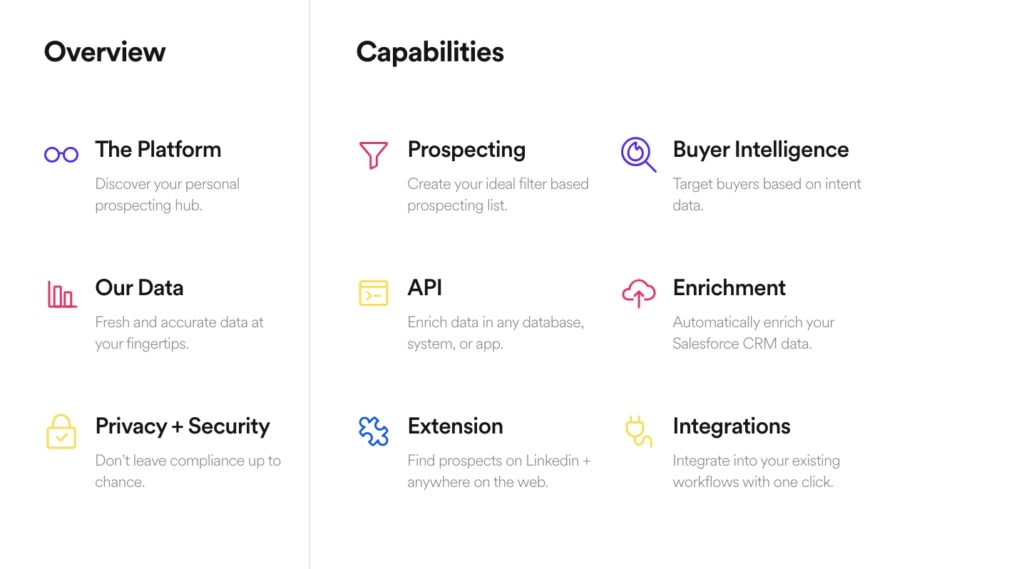
In the competitive landscape of sales intelligence tools, Lusha stands out for its exceptional ease-of-use, characterized by a user-friendly interface that caters to users of all skill levels. Its straightforward design ensures that even those new to sales intelligence platforms can quickly adapt, with helpful tooltips and simple navigation aiding in a seamless user experience. This ease of initiation is a significant advantage for Lusha, as it allows users to bypass extensive training, enabling them to start their lead generation activities more rapidly and efficiently.
Contrastingly, Apollo, while offering a user-friendly experience, presents a more complex interface owing to its advanced feature set. New users often find the multitude of features in Apollo more challenging to navigate initially. It typically demands a longer acclimatization period, especially for those unfamiliar with comprehensive sales intelligence tools. Despite this, Apollo's rich functionalities, once mastered, provide unparalleled capabilities in sales strategy development and lead management. Therefore, while Lusha offers a more accessible entry point for new users, Apollo's sophisticated interface caters to those seeking more advanced sales intelligence solutions, albeit with a steeper learning curve.
Lusha is Better at Enriching Contact Data than Apollo.io
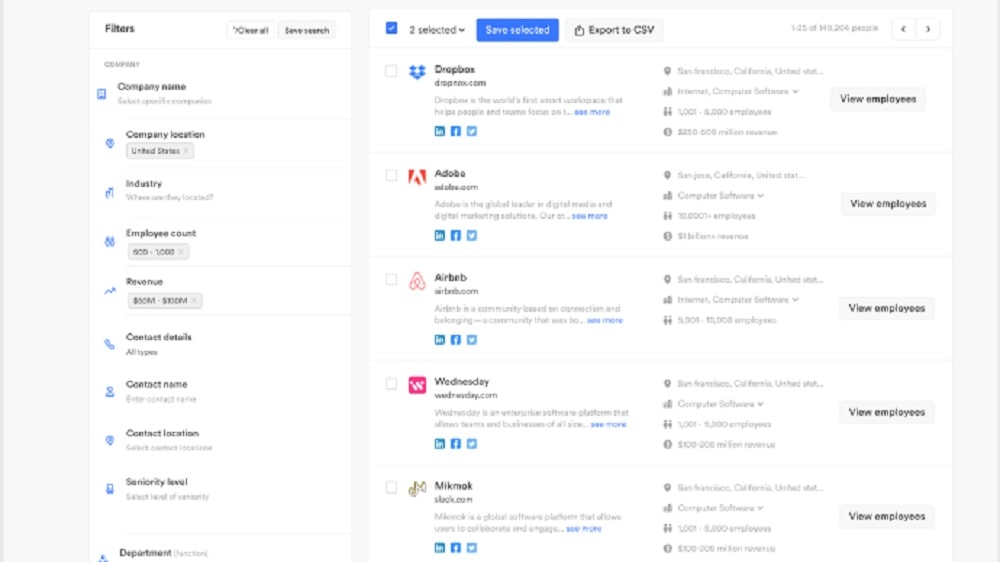
While both Lusha and Apollo.io provide essential contact details, Lusha takes the lead by offering comprehensive lead profiles that encompass a wide range of information, including social profiles, job titles, and detailed company insights. This enriched data empowers users to engage in more effective and tailored outreach, ensuring that every interaction is well-informed and personalized.
On the other hand, while Apollo.io offers contact data, it does not reach the same level of data enrichment and depth as Lusha. Therefore, when it comes to enriching contact data to enhance lead generation and outreach efforts, Lusha leads the way, providing businesses with a valuable asset for their sales and marketing strategies.
Lusha Excels at Contact Data Validation Compared to Apollo.io
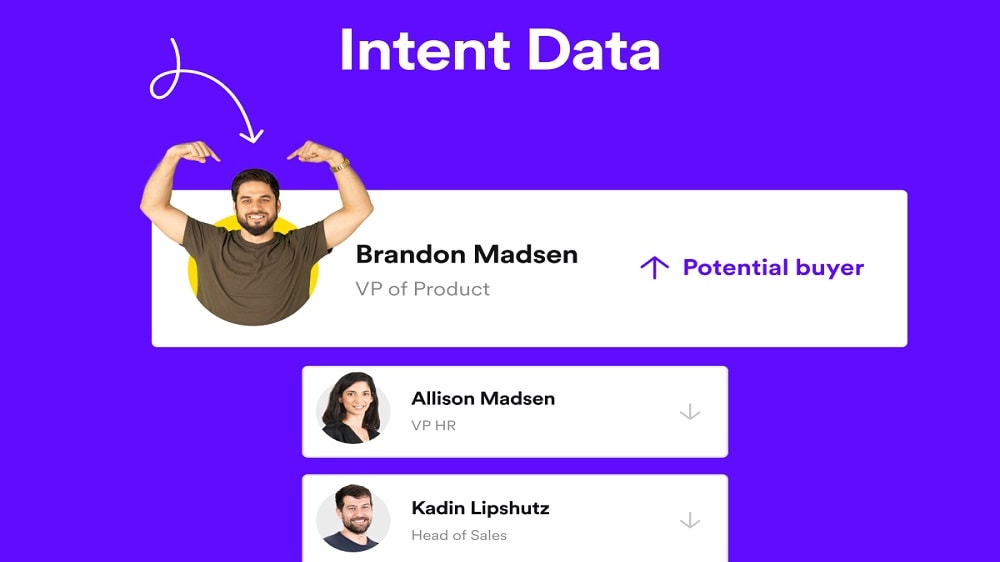
In the realm of contact data accuracy, Lusha takes the lead with its built-in validation system, which serves as a guarantee of the credibility of the provided contact details. This feature plays a crucial role in ensuring the emails and phone numbers obtained through Lusha are not only accurate but also active, significantly reducing the risk of reaching out to inactive or outdated contacts. Lusha's commitment to data verification places it in a prime position for users who prioritize the reliability of their contact information.
In contrast, while Apollo.io offers access to accurate data, it does not emphasize the validation of this information to the extent that Lusha does. As a result, when it comes to the critical task of verifying contact data, Lusha's specialized approach stands out as a valuable asset for professionals and businesses seeking to maintain the highest level of contact data quality and reliability.
Apollo.io is Superior in Streamlining Lead Management than Lusha
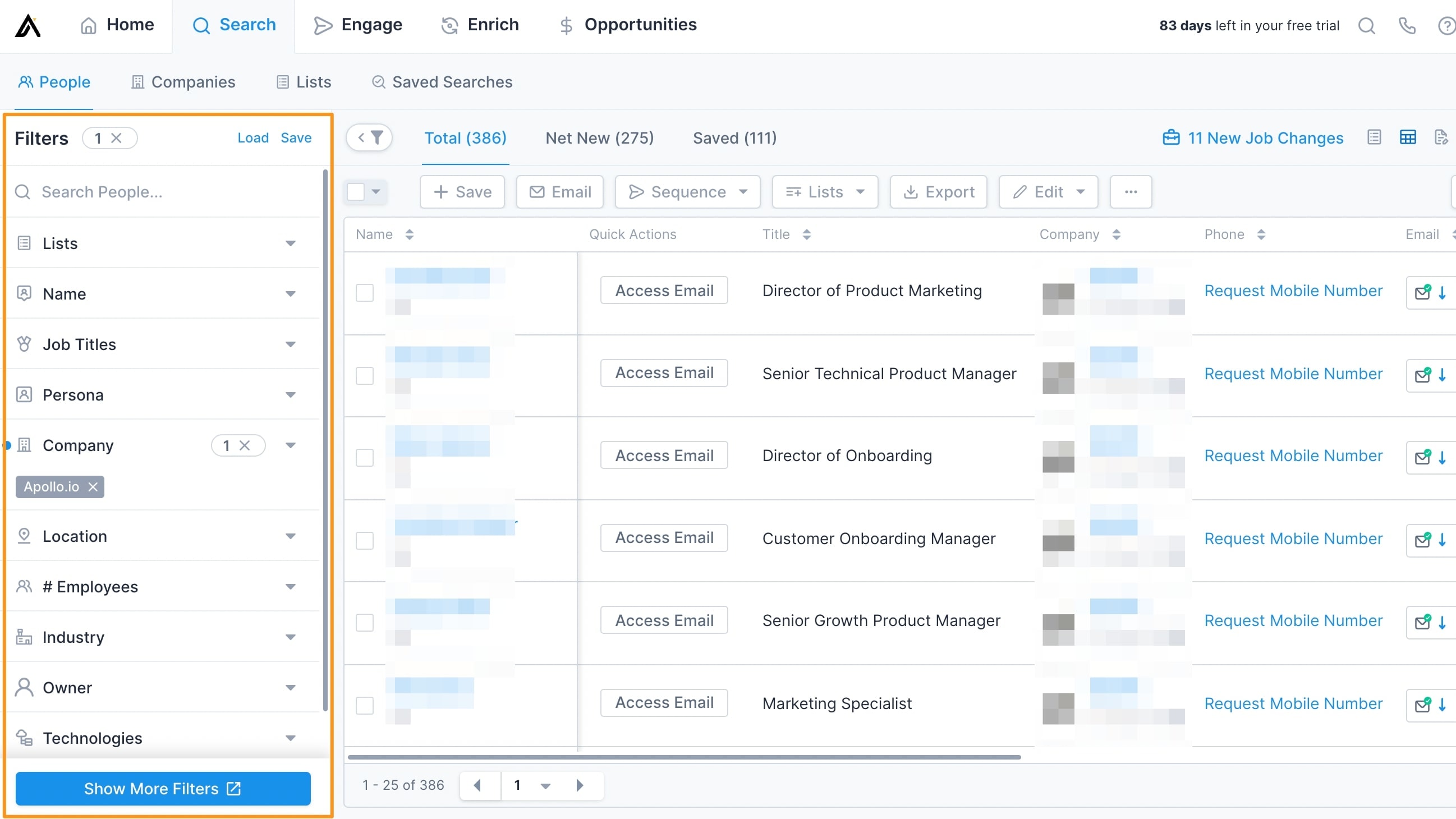
Apollo.io boasts strong lead management features, making it easier for businesses to track and organize leads effectively. Users benefit from the ability to assign tasks, set reminders for follow-ups, and closely monitor the progress of each lead as they traverse the sales funnel. Apollo.io's comprehensive lead management capabilities provide an all-encompassing solution for businesses seeking to streamline their lead handling processes.
On the other hand, while Lusha offers valuable lead scoring, it falls short in providing the extensive lead management and tracking options that Apollo.io offers. This disparity places Apollo.io at the forefront of lead management, particularly for organizations that prioritize comprehensive and effective lead tracking and organization as a fundamental component of their sales strategy.
Apollo Leads Over Lusha in Integration Variety

In the realm of integration capabilities, both Lusha and Apollo offer pathways to external tools, yet their versatility diverges significantly.
Lusha impresses with its API access, enabling tailor-made integrations that can be fine-tuned to meet unique business requirements. It boasts compatibility with renowned CRM platforms such as Salesforce, Zoho, and HubSpot, making it a versatile solution for businesses of various sizes and niches. However, Lusha's direct integration options are relatively limited in comparison to Apollo.
Apollo takes the spotlight in this category, presenting an extensive array of pre-built integrations through platforms like Zapier. This extensive network of integration possibilities caters to a multitude of workflows, enhancing productivity by automating various tasks. Apollo's robust API further solidifies its supremacy, facilitating seamless data exchange across diverse tools, resulting in a harmonized and efficient operational landscape. In summary, while Lusha maintains simplicity with its standard integrations, Apollo surges ahead with its extensive and deeply interconnected integration capabilities, providing a more comprehensive and flexible experience.
Apollo.io Outperforms Lusha in Collaborative Features

Apollo.io takes the lead with its robust set of tools designed to enhance communication and coordination among team members. The platform offers the ability to leave internal notes, share valuable insights, and synchronize activities, fostering a cohesive and collaborative environment conducive to achieving shared objectives. Apollo.io's emphasis on real-time collaboration ensures that teams can work seamlessly together, leveraging the power of collective insights and expertise.
In contrast, while Lusha provides enriched data that facilitates tailored outreach efforts, it does not incorporate real-time collaboration features to the extent that Apollo.io does. Therefore, when it comes to fostering effective team collaboration within a sales or outreach context, Apollo.io shines brighter, offering a comprehensive solution for businesses that prioritize teamwork and information sharing in their lead generation and sales endeavors.
Subscribe to our newsletters.
No FOMO here. Stay up-to-date on all the latest deals and news with our monthly newsletter straight to your inbox like 126,000+ entrepreneurs (+ Get 10% off on on our Premium Membership!)
Lusha vs Apollo.io: Which is the best for your business?
Lusha is the best tool for you if:
- You require accurate and up-to-date contact information for business professionals, offering streamlined access to phone numbers and email addresses.
- You're involved in B2B sales, recruitment, or business development, providing reliable data that can significantly enhance lead generation and networking efforts.
- You prioritize efficiency in verifying and sourcing professional contacts, Lusha's integration with popular platforms like LinkedIn enhances your workflow, saving time and effort.
- You need a user-friendly interface with seamless functionality for gathering contact information, offering an intuitive experience even for beginners.
- You value data accuracy and comprehensive coverage in your professional contact searches, Lusha stands out with its extensive database and high accuracy rates.
Apollo.io is the best tool for you if:
- You're seeking an all-in-one sales platform that combines lead generation, email automation, and data analytics for more effective sales strategies.
- You require a tool that integrates seamlessly with your CRM system, Apollo offers easy synchronization with platforms like Salesforce, streamlining your sales process and data management.
- Your sales teams look for detailed insights into potential leads, providing rich data profiles that include job titles, company information, and contact details.
- You value personalized outreach in your sales efforts, Apollo's advanced segmentation and email sequence features enable targeted communication, increasing engagement and conversion rates.
- You aim to enhance your sales productivity, offering tools for lead scoring, pipeline management, and performance tracking to optimize sales activities.
50% off the annual Basic or Professional plan for 1 year (Up to 5 seats) on Apollo.io
Get 50% off the annual Basic or Professional plan for 1 year (Up to 5 seats) on Apollo.io and up to $4,800 savings with Secret.
Alternatives to Lusha & Apollo.io
Promotions on Lead Management software
Start saving on the best SaaS with Secret.
Secret has already helped tens of thousands of startups save millions on the best SaaS like Lusha, Apollo.io & many more. Join Secret now to buy software the smart way.














